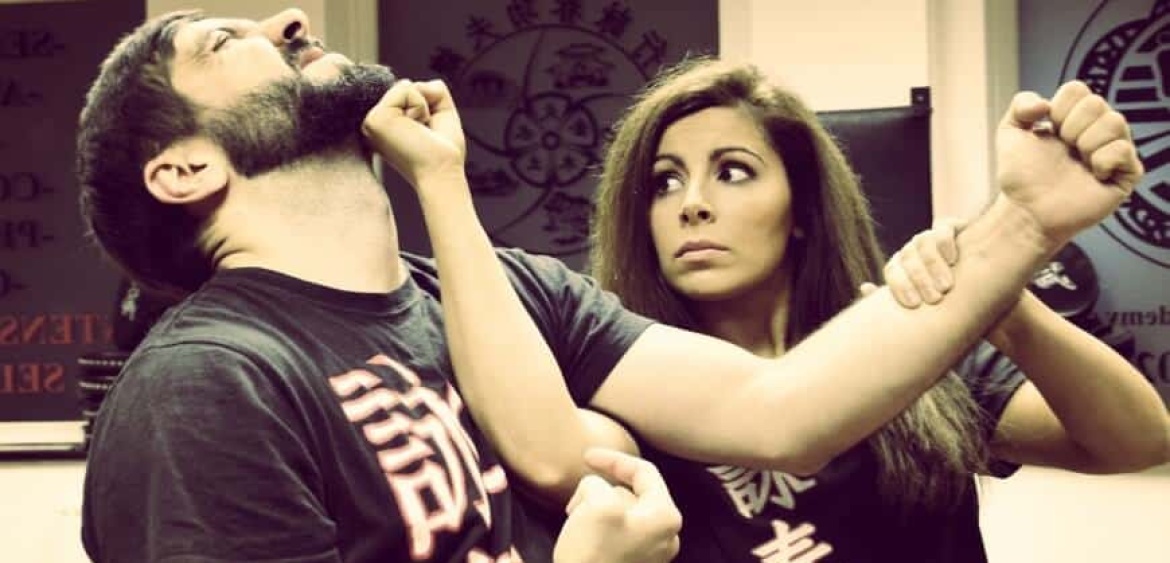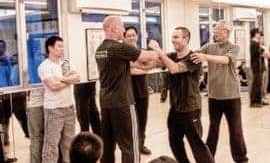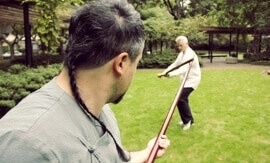
Introduced to Wing Chun at a life-changing time; being a single mum in one of London’s rough suburbs, in a need to learn how to defend herself—Wing Chun was love at first sight for Sifu Della O’Sullivan.
She has trained for over eight years in a Hungarian Leung Ting Wing Tsun lineage. Sifu Della first started teaching in 2007, opening her first school in Dulwich, South London, where she continues to teach to this day.
Sifu Della has taught children of all ages in local schools, run women-only self-defence classes and seminars, assisted in teaching specialist bodyguard courses, and led countless public demonstrations both in the UK and abroad.
In 2011, she performed on stage to a packed audience at the Shaolin Temple in Dengfeng, China, alongside the legendary Shaolin Monks. She has also appeared in several newspaper articles and has been featured in a BBC documentary about positive female role models.
She recently obtained her Fourth Level Instructor Grade in Debrecen, Hungary, and is one of the senior instructors of the Five Elements Wing Tsun Association in London under the guidance of Sifu Róbert Török.
How is it different to learn Wing Chun as a woman and what kind of difficulties have you faced?
At first, it was difficult to achieve the controlled aggression, probably because women are natural protectors and certainly don’t like the thought of hurting anyone, but we can be fierce—just naturally fierce when protecting. I had good feeling and softness, but since I struggled with power and aggression, I imagined I had to protect my son when I practised. I felt the adrenaline and learned to effectively control it, and found that the techniques started to work much better for me. I also had to adapt a lot of the techniques to my height, as I’m only five feet—I find it better to strike under the punch, for example, and my footwork needed to be agiler in order to attack at small and unexpected angles.
However, the most challenging thing was how to become stronger mentally and emotionally to be able to lead and develop others without losing any of my femininity. Because at first, you try to imitate your Sifu, and mine was a man, so I found no one could teach me how to do Wing Tsun as a woman, except myself. I had to find my own way, which took a while, but in the end, I found my balance, meaning I can now help other women find it too.
What do you think is the difference in teaching as a female Sifu?
When I teach, I don’t think of myself as a woman but as a teacher. I have mostly male students and I don’t think they see me that way either. I try to remember that all teachers, regardless of size, height or gender, have the same job—we may have a different approach, but we have to find how it can work for us and how we can adapt our knowledge to best develop our students. I try to focus on that as much as I can. I may be feminine, since I’m a woman, but I’m also a Wing Tsun teacher and the knowledge and moves are the same no matter the gender.
How important is technique and the understanding of the principles?
You can’t separate the two from each other. We stress the importance of the theory of balance; because Wing Tsun combines soft and hard techniques (Yin/Yang). The defending techniques are soft and evasive while the offensive techniques are powerful. Besides, the defending techniques are simultaneous with the offensive techniques.
Have you ever experienced any kind of sexism being a female practitioner?
I have only experienced this sort of thing from people who know me outside of the school, who know me as Della and only see how small and feminine I am—they sometimes don’t believe I can do anything effective. Sometimes, I have had new students who I can see are surprised I’m a teacher, but I like to think they realise that I am good at Wing Tsun and I can teach both men and women, and that’s all that really matters.
How important is the mind in training martial arts?
It is just as important as the physical side—if you don’t have a strong and calm mind and heart, it will affect your physical ability. Martial arts is not just about techniques—it’s about developing oneself, and if you don’t learn to strengthen your mind, you can create problems in life and you may not be aware it is you that is causing them.
Do you believe Wing Chun to be a complete system?
There is more than one good way, but Wing Tsun/Wing Chun needs a basic intelligence and patience because it is combinative, complex in knowledge and has to be understood correctly. And there are some who decide to become instructors immediately after being a student but are no longer interested in training when really that’s when your training should begin.
We believe Wing Tsun/Wing Chun is a complete system; it has all the phases of the fight (one-on-one, multiples, ground fighting and weapons). It is not necessary to mix it with techniques from other martial arts, but sometimes people do so because they may not have learnt the whole system or they just enjoy other styles too. However, if a teacher can demonstrate that they understand what the moves are for in the forms, and how they link together in more than a basic way, then it is a good sign. I can honestly and happily say that I believe there is no ending point, and there is always more to learn and more to understand.
How important is conditioning and physical power in Wing Chun?
Wing Chun is not based on strength, but it is important—if you are only fast and fluid and it doesn’t hurt when you strike, so it requires the balance of the two. However, the power should be dynamic and elastic, not static or rigid. A person should be in good physical shape. At our school, we like to train for strength using our own body weight and isometric training, and there are exercises we do that develop muscles that fit our Wing Tsun. We like conditioning, but it has to be done in the correct way and never to destroy the sensitivity in our limbs, as feeling and skin reflex are our “eyes” in Wing Tsun/Wing Chun.
Why do you think there are so many variations of what is taught at different Wing Chun schools?
It might be that there are intentional changes done just to differ from others. But everybody’s shape and size is different and a good master knows how to adapt their knowledge to different people.
There are few other women trying to emerge in the Wing Chun world. What would you suggest to them in order to make it through these tough environments?
Never ever give up, and embrace being a woman! Never try to impersonate a man. Use your natural abilities and intuitive nature to inspire others, and always be dignified. I love hearing that more women want to make it in the Wing Chun world—after all, our art was named after a woman.



















